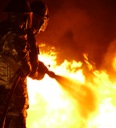
Higher Risk of Bladder Cancer Identified for Retired Firefighters
Researchers from the University of California, San Francisco presented a study yesterday at the Annual Scientific Meeting of the American Urological Association (AUA) that suggests firefighters may be at an increased risk of developing transitional cell carcinoma (TCC), or bladder cancer, and should be considered for routine annual screening. Currently, no guidelines exist for regular TCC screening.
The study states that it is well known that prolonged exposure to certain environmental pollutants and chemicals puts humans at a major risk for developing bladder cancer. As the body absorbs carcinogenic chemicals, such as cigarette smoke, the chemicals are transferred to the blood, filtered out by the kidneys, and expelled from the body through the urine. Greater concentrations of chemicals in the urine can damage the endothelial lining of the bladder and increase a patient's odds of developing transitional cell carcinoma (TCC). Firefighters, who are regularly exposed to smoke and chemical fumes, may be at a higher risk for developing the disease than other groups.
Researchers screened 1,286 active and retired San Francisco firefighters. From August 2006 to March 2007, the subjects--mean age 45 (SD+9.7)--participated in voluntary urine dipstick testing and point-of-care NMP-22 testing. Ninety-three patients tested positive for hematuria and six tested positive for NMP-22. These 99 patients were referred for upper tract imaging, cystoscopy, and urine cytology. Of the group, a single firefighter tested positive for both NMP-22 and hematuria, with two patients--both retired firefighters--ultimately diagnosed with TCC. The age- and sex-adjusted incidence for TCC is 36 per 100,000. According to the researchers, their findings represent a higher incidence, suggesting retired firefighters may be a high-risk group.